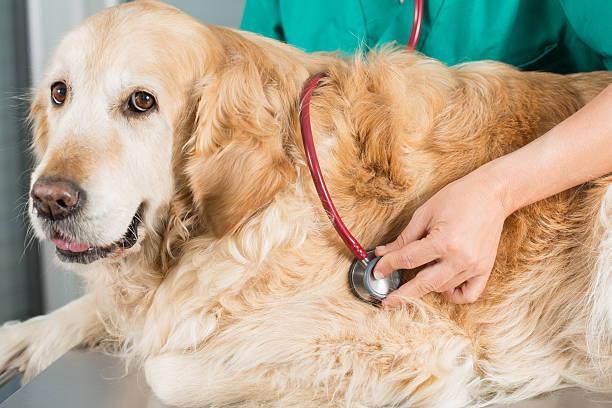Enlarged Spleen in Dogs - Causes

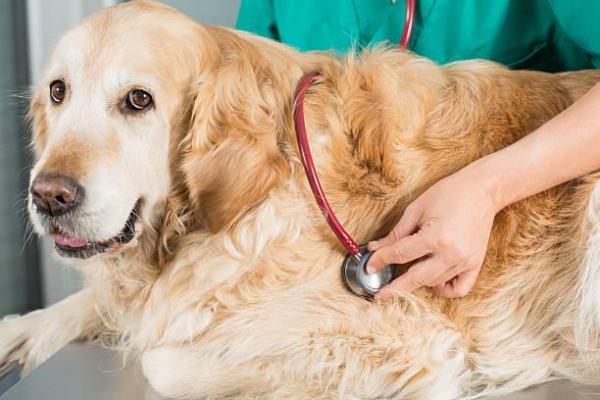

See files for Dogs
The spleen is not a vital organ in dogs, as is the case with humans. This does not mean it lacks importance. It acts as a blood filter and is very useful in a dog's immune response to various pathogens. It is not considered vital because the organism can keep living if it ceases to function. Dogs without a spleen can still have a high quality of life, but they are at a disadvantage. More concerning is when there is a problem with a spleen which causes swelling. This enlargement is a symptom of serious disease which can be life threatening.
At AnimalWised, we look at the causes, symptoms and treatment of an enlarged spleen in dogs. As always, it is important to note that this serious condition needs to be diagnosed and treated by a qualified veterinarian.
Why do dogs have a spleen?
The spleen is an organ that is attached to the stomach. It performs various functions in the dog's organism, among which the following stand out:
- It acts as a reservoir for blood plasma, red blood cells and platelets. This implies that it can release them into the body when necessary.
- It serves as a blood filter, eliminating waste.
- It has an important role in the immune system.
An enlarged spleen in dogs is clinically known as splenomegaly. In these cases, the organ will retain more blood. This makes it more difficult for it to function correctly, worsening as it increases in size. When this occurs, a vicious circle is established. The more the spleen enlarges, the more cells it manages to retain and the more it becomes inflamed. This cycle produces detectable variations in blood tests.
A dog's swollen spleen can be due to different causes, as we will see below. In the most serious cases it will be necessary to remove it surgically. Fortunately, it is possible for a dog to live without a spleen.
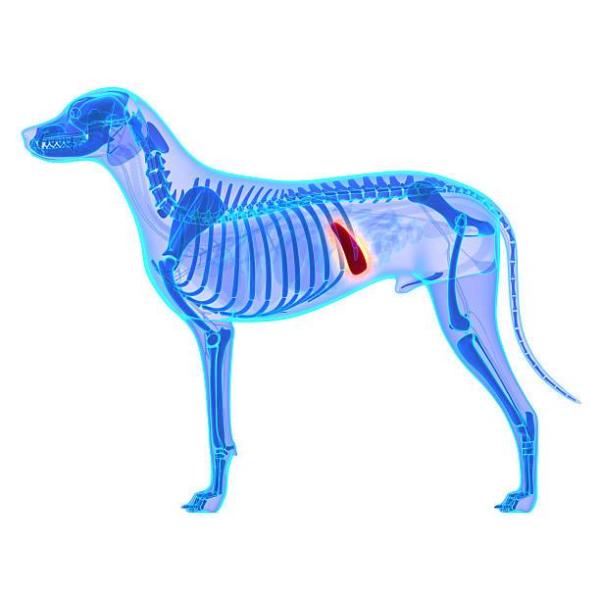
Symptoms of enlarged spleen in dogs
A dog can experience an enlarged spleen for various reasons, especially as a result of various infections. The nature of splenomegaly means that it can go unnoticed for a long period of time since it is often asymptomatic. If signs are present, the most common include:
- Swelling of the abdomen due to the spleen enlargement
- Abdominal pain, especially when palpated
- Weight loss even when eating large amounts
- Anorexia
- Digestive disorders such as vomiting or diarrhea
The specific symptoms will depend on the cause behind this inflammation. Generally speaking, any pathology that affects organs adjacent to the spleen (such as the liver, stomach, etc.) will cause its enlargement. The symptoms typical of disorders of these organs can also point us towards an enlarged spleen. An ultrasound and an x-ray can be used for diagnosis, but a blood test will also provide valuable information.
Causes of enlarged spleen in dogs
Various health conditions can result in a dog's spleen becoming enlarged. These include diseases which can elicit responses in the dog's immune system, often itself being the determining cause of the inflammation. These diseases can be infectious, metabolic or even autoimmune in nature.
- Infection: bacterial, viral or fungal infections can result in splenomegaly. The pathogens infect the body's tissues and the immune response can include inflammation. Symptoms can include fever or whatever the specific infection produces. Treatment includes antibiotics and antifungal medications, although viral infections do not have a direct treatment, instead requiring symptom management to help the dog recover.
- Parasites: a parasitical infection can have a similar effect as other types if infection. Antiparasitic treatment will be required to treat the specific parasite.
- Metabolic and autoimmune diseases: there are various disorders which can cause an imbalance in the dog and result in splenetic enlargement. These include hemolytic anemia, thrombocytopenia, hypothyroidism and lupus in dogs. Management of these disorders will help to reduce various symptoms, including an enlarged spleen.
Since the nature the of causes of enlarged spleen in dogs is so variable, it is very important we take them to a veterinarian for diagnosis. They may be able to treat the underlying disease and reduce the splenetic inflammation sufficiently. However, if the infection has progressed or enough tissue damage has occurred, they may recommend surgical removal of the spleen.
Splenic torsion
Splenic torsion in dogs occurs when the blood supply to the spleen is cut off by mechanical displacement of the organ. It occurs mainly in larger dogs, especially those with deep chests. No specific cause has been determined, but it is associated with intensive exercise and the ingestion of a large amount of food in a short period of time. Other factors may include having previously had surgery and physical trauma.
In this process, the spleen itself dilates and rotates around the gastrosplenic and phrenosplenic ligaments. The result is that the arterial supply and other drainage options are closed. It prevents fluid from entering or exiting the spleen which causes the inflammation. Symptoms can include the dog losing consciousness and other signs they are about to die. It is a veterinary emergency and can lead to the death of the animal.
You will need to take the animal to a veterinarian immediately. Fortunately, splenic dilation is a relatively rare disorder [1]. Unfortunately, this can complicate the diagnosis. The veterinarian will perform various diagnostic tests, but imaging tests such as x-rays or ultrasound will be required to confirm diagnosis of an enlarged spleen.
Trauma
A strong blow can cause damage to the spleen and result in enlargement. Such a trauma can include a traffic collision, fall from a height, physical attack or similar physical incidents. In these cases, a hematoma usually forms which is contained inside the spleen. This causes the risk of splenetic rupture which releases into the abdominal cavity.
Such an incidence of rupture will constitute a veterinary emergency and immediate intervention will be required. In other cases, the trauma may be so severe that the spleen ruptures immediately. These massive hemorrhages may be difficult to observe from the outside, but we will likely see symptoms such as pale mucus membranes, shivering, weakness, labored breathing and entering a state of shock. Treatment will likely require blood transfusion and surgical intervention.
Trauma can affect various tissues in a dog's body. Learn about a more common issue with our article on aural hematoma in dogs.
Source: Alimentacioncanina.com
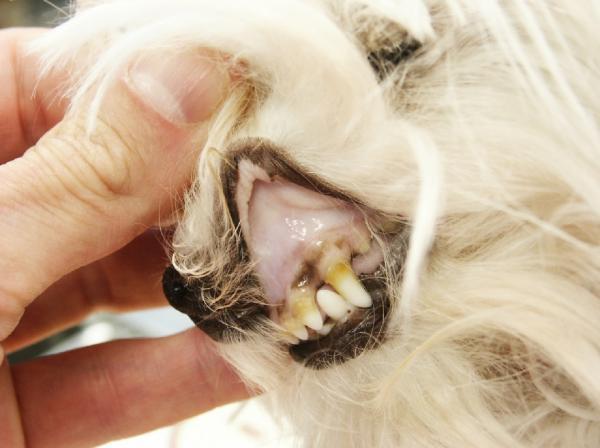
Cancer
Our dog may have an inflamed spleen due to the presence of tumors. These may be benign or malignant, so the veterinarian will need to run the correct diagnostic tests such as a biopsy for a cytological study of the tumor. This will both determine the correct course of treatment and help to provide a likely prognosis for the problem. If the splenetic tumor is malignant, it is possible the cancer can metastasize to other tissues.
In some cases, the treatment of such cancer in dogs can be effective with chemotherapy or radiotherapy. In other cases, surgical removal of the tumor will be required. Often a combination of treatments will be necessary. Prognosis depends on whether the tumor is malignant, if the cancer has metastasized and the size of the tumor. Even benign tumors of the spleen can require surgical removal if it is sufficiently large.
Learn more about the different types of tumors that can affect dogs.
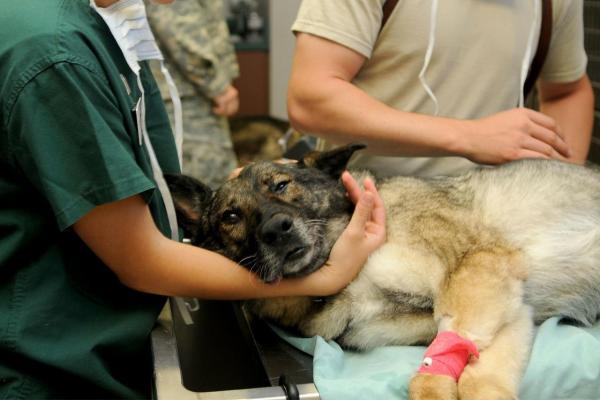
Splenectomy in dogs
We have already looked at the enlargement spleen in dogs treatment according to its specific cause. As you can see, surgical removal of the spleen is common when the problem is serious. Splenectomy consists of the total or partial removal of the spleen. It is reserved for cases in which maintaining the organ is more harmful than removing it.
Although it is possible to live without a spleen, its absence causes harm to the dog. These risks include greater prevalence of contracting diseases and/or lower resistance to them. For this reason, it is recommended to strictly maintain the vaccinations of any dog, especially if they have had a splenectomy. An elnarged spleen in dogs is not a minor issue and requires a immediate veterinary evaluation.
If the veterinarian finally decides that the best option is to remove this organ, consult our article on how to care for a dog after spleen removal.
This article is purely informative. AnimalWised does not have the authority to prescribe any veterinary treatment or create a diagnosis. We invite you to take your pet to the veterinarian if they are suffering from any condition or pain.
If you want to read similar articles to Enlarged Spleen in Dogs - Causes, we recommend you visit our Other health problems category.
1. Hughes, J. R., Johnson, V. S., & Genain, M. A. (2020). CT characteristics of primary splenic torsion in eight dogs. Veterinary radiology & ultrasound: the official journal of the American College of Veterinary Radiology and the International Veterinary Radiology Association, 61(3), 261–268.
https://doi.org/10.1111/vru.12844





